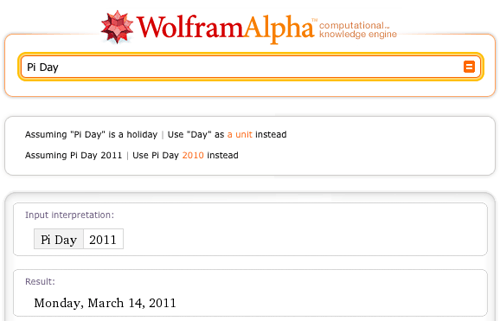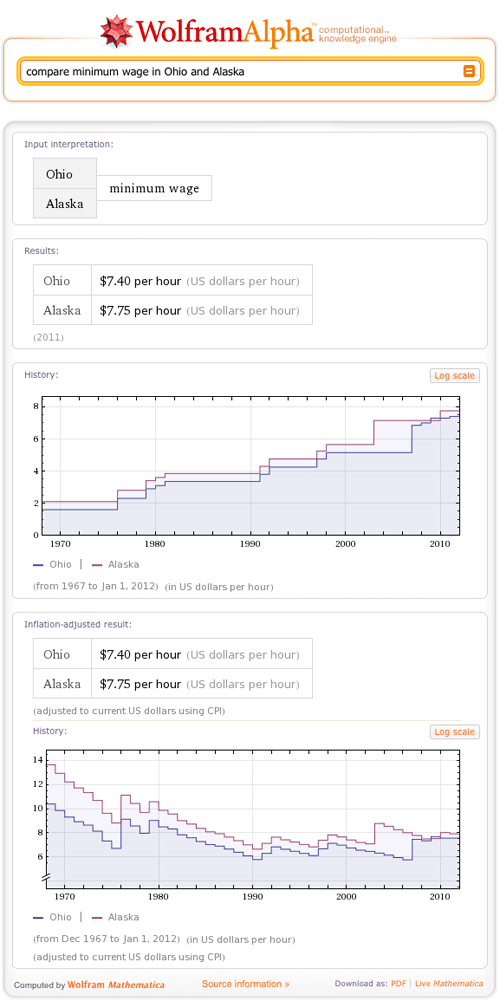
 4
4
Today we are releasing Wolfram Multivariable Calculus and Wolfram Astronomy, the next two apps on a growing list of Wolfram Course Assistant Apps. These course assistants will help students learn their course material using the power of Wolfram|Alpha.
The Wolfram Astronomy Course Assistant allows you to easily look up information on constellations and planets, but it can also calculate anything from the next lunar eclipse to the solar interior.
 15
15
By now, you’ve probably noticed those cute black and white squares popping up on everything from T-shirts to magazine advertisements to cereal boxes. These are called Quick Response (QR) codes, and thanks to the rise in smartphone use, they are becoming more popular than ever.

Since their inception in 1994 in Japan, QR codes have quickly risen in popularity throughout many Asian countries. The technology is still finding its footing in the United States and other western countries, but many advertisers and niche communities are adapting the 2D barcode innovation. Flip open your favorite magazine and you will most likely see the stamp-like code on multiple advertisements.
Wolfram|Alpha now offers the capability to produce QR codes. Just type in “QR code” in addition to whatever information you want to be coded. The function can encode up to 7 KB of data, including phone numbers, email addresses, URLs, or just plain text.
More »
 2
2
Spring has officially sprung, and here in the Midwest, we’re eagerly ice picking our way out of hibernation for some fun in the Sun! Some of us are enjoying the extended daylight hours, and others are jetting off to tropical spring break destinations.
While we were nestled by our office heaters, drinking Swiss Miss, and dreaming of the bright sunshine, we developed a few new tools in Wolfram|Alpha that give you facts on how to keep your skin healthy while enjoying the Sun. To get started, simply query “time to sunburn”. This query allows you to calculate how long your skin can be exposed to the Sun without burning based on your skin type, location, time, the level of Sun protection factor (SPF) you might be using, and how long you stay in the Sun. You can also select “UV index” for results based on the UV index, your skin type, SPF, and time in the Sun.
The personalized results show how long you can stay in the Sun before you’re likely to burn based on the factors you reported, a Sun protection advisory recommending an SPF level, and a UV forecast for your location. More »
 2
2
Do you need to work with numbers that are of the magnitude of thousands, millions, or even billions? How about the thousandths, millionths, or billionths? Scientists and engineers need to work with really large and really small numbers every day. Now Wolfram|Alpha can help put all of those large and small numbers into scientific notation. For example, the Earth’s mass is about 5973600000000000000000000 kg, but it is nicely represented in scientific notation as 5.9736×10^24 kg.
 8
8
One of the most commonly used materials all around us is wood. There are many different kinds of woods with wide ranging mechanical, physical, and thermal properties, which make them suitable for different applications. From building houses to making kitchenware, wood is an ideal and easy to use material. In general, wood is broadly available at reasonable prices and is easily formable, making it desirable for construction work. Of course, depending on the application, different properties of wood are desirable. For example, for building a house with wood, high strength is desired, whereas for making a cutting board, you probably want something that has a harder surface so it doesn’t get dented easily. Wolfram|Alpha now has a large database of all kinds of wood and their various properties.
There are various ways you can obtain data on woods using Wolfram|Alpha. If you need to quickly skim through the different kinds of woods, Wolfram|Alpha can generate a quick report of properties of a certain kind of wood.
 7
7
Yes, it is once again the time of the year when the mathematically inclined gather together to celebrate Pi Day…
…and, in the process, swap trivia of note on everyone’s (including Wolfram|Alpha’s) favorite number.
There have been no shortage of blog posts already written on the subject; see, for example, last year’s “Pi Day in Wolfram|Alpha” (or the Wolfram Blog Pi Day posts from 2008 or 2010). As already hinted at in last year’s blog, one would expect the pi to be ubiquitous in a computational knowledge engine—and so it is. Therefore, at the risk of beating a proven transcendental constant to death, this year we offer a few (well, OK: more than a few) additional pi-related esoterica courtesy of Wolfram|Alpha.
More »
 6
6
Remember those dynamic calculators we mentioned back in November?
Well, they’re back… with more features! We’ve released a whole new batch of calculators that cover some different areas of math.
For those who don’t remember, in November, we released calculators capable of computing integration, limits, date differences, and more. With this new slew of calculators, we are covering some other commonly asked math concepts, like vector and matrix manipulation, GCD, LCM, inverses of functions, linear approximation of functions, 3D plotting, base conversions, and currency conversion.
More »
 4
4
Wolfram|Alpha recently added information about the minimum wage in U.S. states (from 1967 through today) based on data from the U.S. Department of Labor. This means you can ask Wolfram|Alpha about simple historical facts, like the U.S. minimum wage in 1980, or perform simple analyses, like comparing the current minimum wage in Ohio and Alaska.
 2
2
Students of the history of science will recall learning that Galileo observed and described the periodic motion of a simple pendulum around 1602. Until being supplanted by other technologies around the first third of the 20th century, this property of pendula has been indispensible in the creation of accurate timekeeping devices.
An idealized pendulum consisting of a weight (often called a “bob”) on the end of a massless cord and suspended from a frictionless pivot is called a simple pendulum or, more explicitly, a simple gravity pendulum. Wolfram|Alpha has known about simple pendula for some time, as you can verify by entering “pendulum”. In fact, doing so brings up not one but two pendulum results:









